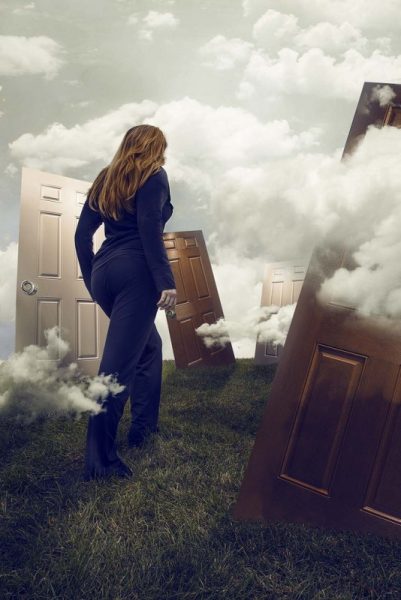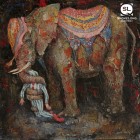The world of the story feels so immediate and so richly rendered. Is this a place that exists for you in real life?
Yes. This story takes place in a fictional version of my parents’ house, which was originally a stagecoach stop built in 1838. The road to the bridge is one I traveled every day. Because of the isolated location of the house, we used to have stranded folks knocking on our door from time to time who ran out of gas or got stuck in the snow, etc. The idea that this house was a way station for all these decades intrigued me. “Bait” is part of a manuscript in progress that deals with this house and the surrounding area through history. In particular, this story was inspired from my father telling me about one summer night when a man came to the house asking for fuel. It was a night when my mother and I were away. He said the stranger unnerved him. You’d have to know my father to fully appreciate this, but he doesn’t scare easily, and something about the look on his face when he told me, I thought, Whoa, Moses, what kind of man made him feel like that? You start asking yourself what if, what if? Therein came the story.
There’s a moment in the story when the narrator refers to the men that pass through as “misfits,” and I couldn’t help but think of the Misfit from Flannery O’Connor’s “A Good Man is Hard to Find.” And there’s a kinship, I think, between the timing and tenseness of “Bait” and O’Connor’s writing. I’m wondering if you draw influence from O’Connor. But if not, I’d love to hear about other writers that you’ve learned from.
I adore Flannery O’Connor’s work. Her stories, as well as her book Mystery and Manners, have served as a profound teacher to me. I am so grateful for the inspiration of women writers like Flannery O’Connor, Eudora Welty, Octavia Butler, and Shirley Jackson. Women who could write funny then chill you right down to the bone in the next sentence. That is power. That is the kind of writing I aspire towards. Some work I read over and over, like Toni Morrison’s Beloved, William Faulkner’s Light in August, and all the poetry of Brigit Pegeen Kelly. I have to credit influence of both of my grandmothers’ abilities, too, both vivid and audacious storytellers. I learned a lot about narrative tension sitting at their feet.
One of my favorite aspects of “Bait” was the brilliant way you set up what felt like stage directions on the page. Where characters are located is so utterly important to the way pressure builds over the course of the story. (The scene when the stranger is peering past the narrator toward Emma: Holy crap!) When you’re writing a scene, where does it begin? Have you already visualized the space and where the characters are located, or does it come to life as your write?
For me, characters start talking and their language builds a narrative landscape. A scene is built around one key raw spot. Body language pushes back against dialogue. In the case of “Bait,” I wanted to play on the power struggle I have often observed between men in close quarters, especially men who don’t know each other, and add to that something at risk. With that in mind, a scene unfolds on how power is interpreted between characters, and lost or gained through body language.
The stranger is more or less an out-and-out antagonist in this story. Like the Misfit or Arnold Friend from Oates’ “Where Are You Going, Where Have You been?” he is the villain in this tale. So I have to ask: who are some literary villains you love?
That is such a good question! I am fascinated by what gets a villain made, the combination of experience and choices that brings them to particular defining moments. Richard III has some of the best wicked lines in literature! Lady MacBeth is at the top of my list. Mr. Dark from Something Wicked This Way Comes, too, and of course Professor Snape from the Harry Potter series was so great because he was darkly funny. Straight cruelty is obscene, really; it’s the emotional layering of a villain that fuels the reader’s interest, and certainly mine as a writer. So perhaps the best and most complicated of all is Mercury Thunder, the reservation witch, from Susan Powers’ novel, Grass Dancer.
I love that Emma wanted a German Shepherd puppy. I think the dog breed you gravitate toward says a lot about who you are as a person. So–and this might be my most important question–what kind of dog would you ask for? And what would its name be?
I agree! I have loved dogs since I knew they existed. My grandmother had a German Shepherd when I was growing up. His name was Ace. He would have held his ground against the devil for any of us. I chose that breed for the story because that’s a dog that implies a kind of fierceness, a dog that takes its job as part of the family quite seriously. I have an Alaskan Malamute named Jake. Malamutes as a breed are just magnificent, sassy talkers, full of joy and energy. Malamutes have all the good looks of a German Shepherd but with more of a sense of humor. I could have done this whole interview just about Jake. So to answer your question, I would always ask for a Malamute.



 The core workshop of SmokeLong Fitness is all in writing, so you can take part from anywhere at anytime. We are excited about creating a supportive, consistent and structured environment for flash writers to work on their craft in a community. We are thrilled and proud to say that our workshop participants have won, placed, or been listed in every major flash competition. Community works.
The core workshop of SmokeLong Fitness is all in writing, so you can take part from anywhere at anytime. We are excited about creating a supportive, consistent and structured environment for flash writers to work on their craft in a community. We are thrilled and proud to say that our workshop participants have won, placed, or been listed in every major flash competition. Community works.